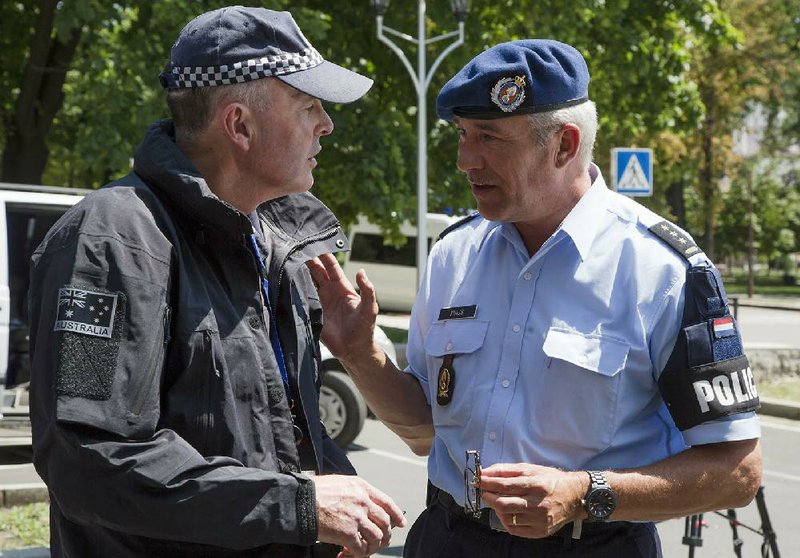DONETSK, Ukraine -- Ukrainian armed forces mounted a major onslaught against pro-Russia separatist fighters Sunday in an attempt to gain control over the area where a Malaysia Airlines plane was downed earlier this month.
The U.S. State Department, meanwhile, released satellite images that it says back up its claims that rockets have been fired from Russia into eastern Ukraine and heavy artillery for separatists has also crossed the border.
Reports of the intensifying unrest in eastern Ukraine prompted a postponement of a trip to the site by a team of Dutch and Australian police officers who had planned to start searching for evidence and the remaining bodies.
In the Netherlands, Prime Minister Mark Rutte said his government has rejected the idea of deploying armed troops to secure the crash site because there is no way they could achieve "military superiority" in a region where heavily armed pro-Russia rebels are battling Ukrainian government forces.
"The option we looked at was a military option in which you could secure the area so you can work in a stable environment," Rutte said. But "that the option would be such a provocation to the separatists that it could destabilize the situation."
Ukraine's National Security Council said Sunday that government troops have encircled Horlivka, a key rebel stronghold, and that there had been fighting in other cities in the east. Horlivka is about 20 miles north of the main rebel-held city of Donetsk.
The armed forces "have increased assaults on territory held by pro-Russia mercenaries, destroyed checkpoints and positions and moved very close to Horlivka," the council said in a statement.
A representative of the separatist military command in Donetsk confirmed that there had been fighting in Horlivka but said rebel fighters were holding their positions.
By Sunday evening, the Ukrainian advance had blocked a key road leading from the provincial capital, Donetsk, to the airplane debris northeast of Shakhtarsk, but it remained unclear whether government troops were in control of all or part of the approximately 14 square miles of debris fields.
Elsewhere, Russian state news agency RIA Novosti reported Sunday that a column of Ukrainian armored personnel carriers, trucks and tanks had entered the town of Shakhtarsk, 10 miles west of the site of the Boeing 777 crash.
The government accused rebel forces of firing rockets Sunday on residential apartment blocks in Horlivka in what they said was an attempt to discredit the army and whip up anti-government sentiment. The separatists' self-declared "Donetsk People's Republic" has accused the army of being responsible for that and other rocket attacks in nearby cities.
The Donetsk regional government -- which is loyal to Kiev and based elsewhere since rebels took over the area -- said Sunday in a statement that at least 13 people, including two children ages 1 and 5, were killed in fighting in Horlivka. It said another five people were killed as a result of clashes in a suburb north of Donetsk.
The satellite images released by the U.S. director of national intelligence show blast marks where rockets were launched and craters where they landed. Officials said the images show heavy weapons fired between July 21 and Saturday -- after the July 17 downing of Malaysia Airlines Flight 17.
The four-page memo containing the images is part of the Obama administration's push to hold Russia accountable for its activities in neighboring Ukraine.
Moscow has angrily denied allegations of Russia's involvement in eastern Ukraine. Russia's Foreign Ministry over the weekend accused the U.S. of conducting "an unrelenting campaign of slander against Russia, ever more relying on open lies."
Secretary of State John Kerry spoke by phone Sunday with Russian Foreign Minister Sergei Lavrov, urging him to stop the flow of heavy weapons and rocket and artillery fire from Russia into Ukraine, a State Department official said. Kerry did not accept Lavrov's denial that heavy weapons from Russia were contributing to the conflict, said the official, who spoke on condition of anonymity to provide details of the call.
Malaysian Airlines Flight 17 was shot down with a surface-to-air missile over a part of eastern Ukraine controlled by pro-Russia separatists, killing all 298 people on board. U.S. and Ukrainian officials say it was shot down by a missile from rebel territory, most likely by mistake.
Ten days after the disaster, a full-fledged investigation still has not begun at the crash site, with some bodies still unrecovered and the site forensically compromised.
It remained unclear when the forensic experts from the Netherlands and Australia would be able to begin their work at the site.
Alexander Hug, the deputy head of a monitoring team from the Organization for Security and Cooperation in Europe, said it was too dangerous for the unarmed officers to travel there from their current location in Donetsk.
"We reassess the situation continuously, and we will start to redeploy tomorrow morning back to the site if the situation changes," Hug said.
Australian Prime Minister Tony Abbott had said earlier Sunday that unarmed Australian police would be part of the Dutch-led police force to secure the area and help recover victims' remains.
Abbott said that by using unarmed police, Ukraine's parliament won't need to ratify the deployment as it would if the security force were to be armed.
"This is a risky mission. There's no doubt about that," Abbott told reporters. "But all the professional advice that I have is that the safest way to conduct it is unarmed, as part of a police-led humanitarian mission."
Malaysian Prime Minister Najib Razak said in a statement that his country would send dozens of police and that his country had received assurances from pro-Russia separatists that they would provide protection for investigators.
Information for this article was contributed by Nataliya Vasilyeva, Mike Corder, Vanessa Gera, Deb Riechmann and Philip Elliott of The Associated Press.
A Section on 07/28/2014

